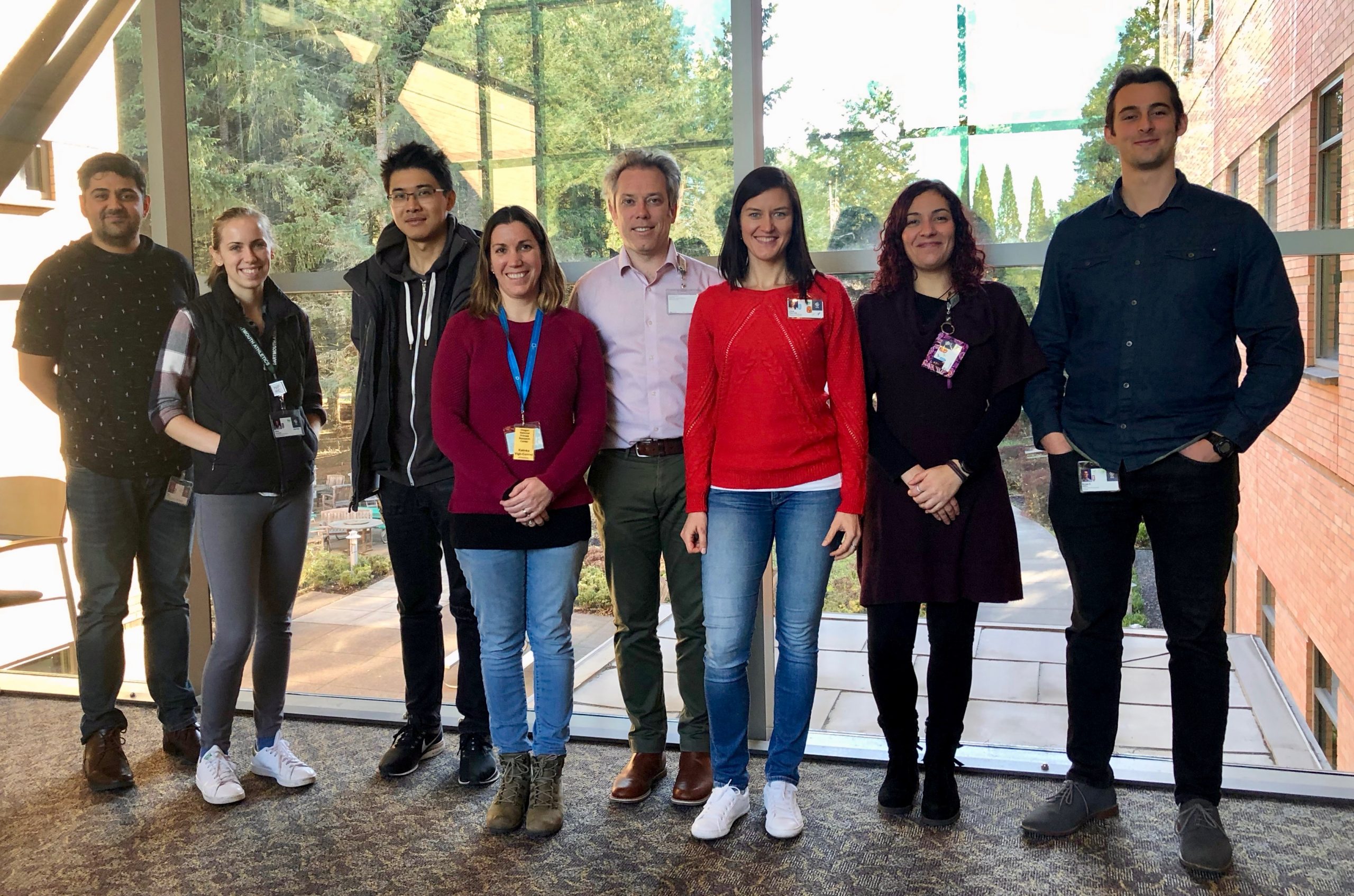
Associate Professor and Chief
Division of Genetics
Oregon National Primate Research Center
Oregon Health & Science UniversityAssociate ProfessorAssociate Professor
Associate Professor
Center for Embryonic Cell & Gene Therapy
Oregon Health & Science
Telephone: +1-503-346-5430
email: conradon@ohsu.edu
Lab website: https://conradlab.org/
GEMINI website: https://gemini.conradlab.org/
Team Members

OREGON HEALTH & SCIENCE UNIVERSITY
- Ana Lima – Postdoctoral Fellow
- Liina Nagirnaja – Senior Research Associate, GEMINI study coordinator
- Katinka Vigh-Conrad – Lab Manager
- Ran Yang – Computational Biologist
- Eisa Mahyari – Computational Biologist
- Alexandra Stendahl – Research Assistant
WORKING GROUP: CO-LEAD ON GENOMICS AND BIOINFORMATICS WITH DR. VELTMAN
The genomics and bioinformatics working group will focus on setting standards for performing, analyzing and sharing data from genomics studies.
Assoc. Prof. Don Conrad’s lab aims to promote interdisciplinary research by integrating expertise from wet lab, bioinformatics and clinical collaborators.
The main focus in the field of male infertility currently includes overseeing the Genomics of Male Infertility Initiative (GEMINI) study aiming to map the genetic causes of idiopathic severe male infertility. The GEMINI network includes 20 andrology and research centres across the world providing access to a large sample set of the cases (currently n=3500). To date, 1200 patients of non-obstructive azoospermia have been analysed on a whole-exome sequencing platform. Identification and interpretation of the generated large-scale sequencing data is facilitated by access to high-throughput computing facility and the availability of bioinformatics research tools developed in the Conrad lab (Wilfert et al. Nat Genet. 2016).
In addition to genomics research, the Conrad lab holds expertise in developing and implementing a spectrum of novel methods for analysing the molecular and genetic properties of the germline. These include single-cell RNA sequencing of germ cell populations (Jung et al. eLife. 2019), in vivo siRNA knock-down of target genes in mouse testis (Ho et al. G3 (Bethesda). 2017), good quality purification of male germ cell populations from various species (Lima et al. J. Vis. Exp. 2017) and de novo mutation detection from small pools of germ cells.
Furthermore, the group aims to maintain the interdisciplinary profile by validating a multitude of NOA candidate genes identified in the framework of the GEMINI study in model organisms. Functional follow-up of potential mutations is done in Drosophila, mouse, zebrafish and Chlamydomonas in collaboration with local and international research groups.
Assoc. Prof. Conrad has a dual appointment in the OHSU medical center and at the Oregon National Primate Research Center, where he is chief of the Division of Genetics. The Conrad lab continues all of its work in human infertility, with the aim of using non-human primate species for translational research into new treatments for infertility.
Houston BJ, Conrad DF, O’Bryan MK (2020) A framework for high-resolution phenotyping of candidate male infertility mutants: from human to mouse. Hum Genet.
Bustamante-Marin XM, Shapiro A, Sears PR, et al (2020) Identification of genetic variants in CFAP221 as a cause of primary ciliary dyskinesia. J Hum Genet 65:175–180.
Lee AS, Rusch J, Lima AC, et al (2019) Rare mutations in the complement regulatory gene CSMD1 are associated with male and female infertility. Nat Commun 10:4626.
Jung M, Wells D, Rusch J, et al (2019) Unified single-cell analysis of testis gene regulation and pathology in five mouse strains. Elife 8:.
Kasak L, Punab M, Nagirnaja L, et al (2018) Bi-allelic Recessive Loss-of-Function Variants in FANCM Cause Non-obstructive Azoospermia. Am J Hum Genet 103:200–212.
Nagirnaja L, Aston KI, Conrad DF (2018) Genetic intersection of male infertility and cancer. Fertil Steril 109:20–26.
Nagirnaja L, Vigh-Conrad K, Conrad D (2017) How to Map the Genetic Basis for Conditions that are Comorbid with Male Infertility. Semin Reprod Med 35:225–230.
Ho NRY, Usmani AR, Yin Y, et al (2017) Multiplex shRNA Screening of Germ Cell Development by in Vivo Transfection of Mouse Testis. G3 (Bethesda) 7:247–255.
Ho NRY, Huang N, Conrad DF (2015) Improved detection of disease-associated variation by sex-specific characterization and prediction of genes required for fertility. Andrology 3:1140–9.
Ni B, Lin Y, Sun L, et al (2015) Low-frequency germline variants across 6p22.2-6p21.33 are associated with non-obstructive azoospermia in Han Chinese men. Hum Mol Genet 24:5628–36.
Lima AC, Carvalho F, Gonçalves J, et al (2015) Rare double sex and mab-3-related transcription factor 1 regulatory variants in severe spermatogenic failure. Andrology 3:825–33.
Lopes AM, Aston KI, Thompson E, et al (2013) Human spermatogenic failure purges deleterious mutation load from the autosomes and both sex chromosomes, including the gene DMRT1. PLoS Genet 9:e1003349.
Funding
Ongoing Research Support
P51OD011092-60 (PI Barr-Gillespie) 05/01/2019-04/30/2024 | NIH/OD
Title: Support for National Primate Research Center
Goal: The major goal of this project is to provide the support for specialized facilities, scientific and technical personnel, and NHP species needed for the conduct of biomedical research at the Oregon National Primate Research Center.
Role: Associate Professor, Division Chief
R01HD078641-06 (PIs Conrad & Aston) 09/10/2014-05/31/2020 | NIH/NICHD
Title: Genomics of Spermatogenic Impairment
Goal: The goal of the project is to map the genetic basis of male infertility using genetic epidemiology.
Role: MPI
P50 HD096723-01A1 (PI Orwig) 04/01/2019-03/31/2024 | NIH/NICHD
Tile: Genetics of Male Infertility: A Marker of Overall Health
Goal: The objective of this NCTRI P50 Center for Reproductive Genetics and Therapy is to improve knowledge about the genetic basis of infertility and overall health comorbidities to aid in the counseling of infertile couples; justify the development of diagnostic screens; and develop patient-specific treatment options.
Project I Title: Discovery and Annotation of Targets for Gene Therapy of Infertile Men (Conrad)
Project I goal: The goal of this project is to develop knowledge bases that summarize the evidence from model organisms that these mutations can cause pathology in both gonadal and somatic tissues.
Project I Role: PI
P60 AA010760-24 (PI Richards) 01/01/2016-12/31/2020 | NIH/NIAAA
Title: Behavioral Genomics of Alcohol Neuroadaptation
Goal: This research Center is comprised of 6 components and focuses on the behavioral and genetic consequences of alcohol use and the genetic risk factors involved in the etiology of alcohol use.
Role: Bioinformatics Core Director
Completed Research Support
R01HG007178-06 (PI Conrad) 05/08/2014-02/28/2020 | NIH/NHGRI
Title: Analysis of De Novo Mutation from sequencing of related individuals and cells
Goal: The goal of this project is to build a statistical framework for detecting de novo mutations from sequencing of DNA and RNA from related individuals, tissues and cells.
Role: PI
R01HG007178-04S1 (PI Conrad) 09/14/2017-02/28/2019 | NIH/NHGRI
Title: Analysis of De Novo Mutation from sequencing of related individuals and cells
Goal: The goal of this project is to build a statistical framework for detecting de novo mutations from sequencing of DNA and RNA from related individuals, tissues and cells.
Role: PI
R01MH101810-03 (PI Conrad) 08/01/2013-06/30/2018 | NIH/NIMH
Title: Modeling the effects of structural variation in GTEx data and Mendelian disease
Goal: The goal of this study is to learn the impact of variation in chromosome structure on gene expression in the Genotype Tissue Expression (GTEx) project, and then use this information to build a model to predict the functional impact of de novo and rare structural variants.
Role: PI
R01MH101810-03S1 (PI Conrad) 07/01/2016-06/30/2018 | NIH/NIMH
Title: Modeling the effects of structural variation in GTEx data and Mendelian disease
Goal: The goal of this study is to learn the impact of variation in chromosome structure on gene expression in the Genotype Tissue Expression (GTEx) project, and then use this information to build a model to predict the functional impact of de novo and rare structural variants.
Role: PI
R01HD078641-05 (PIs Conrad & Aston) 09/10/2014-05/31/2019 | NIH/NICHD
Title: Genomics of Spermatogenic Impairment
Goal: The goal of this project is to characterize the genetic basis of human spermatogenic impairment using genetic epidemiology.
Role: MPI
